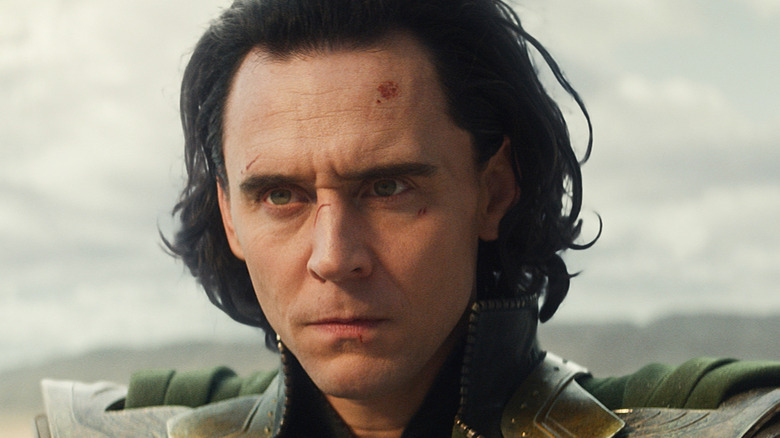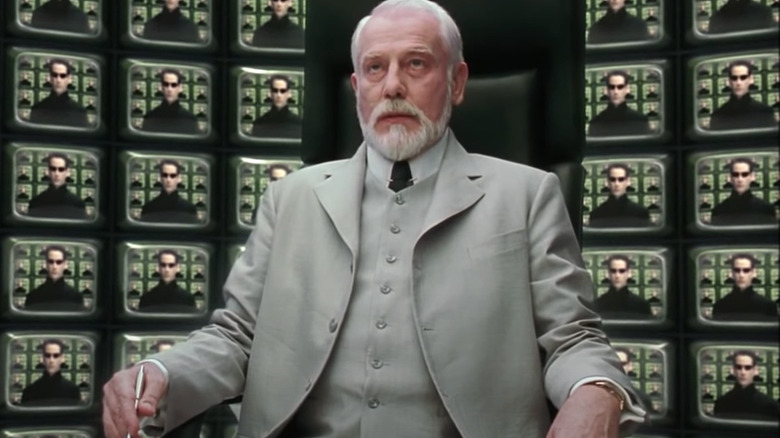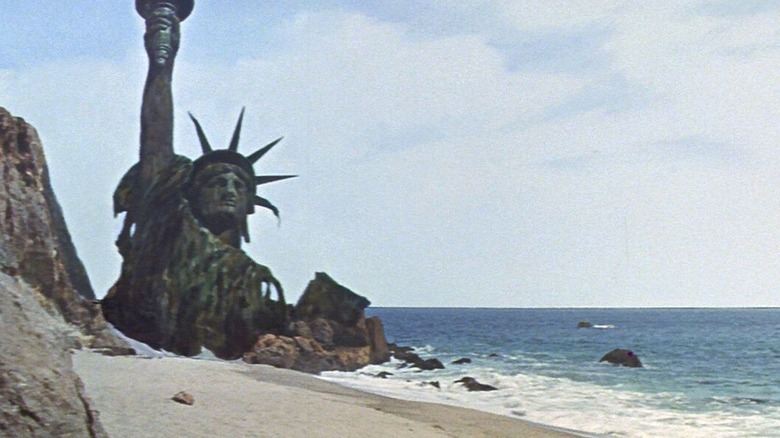The Unexpected Influence Behind The Ending Of Loki Season 1
Contains spoilers for "Loki"
The Disney+ Marvel shows largely wear their influences on their sleeves. "WandaVision" is an homage and deconstruction of American sitcoms, and "The Falcon and the Winter Soldier" is influenced by spy thrillers. "Loki" has certain obvious influences as well. Since the series involves traveling through time and space with one character essentially being played by multiple actors, the obvious comparison is "Doctor Who." However, not all influences are obvious, and as "Loki" reached its Season 1 finale, the classic franchises that influenced how the stories end are a little less clear.
In Episode 6, "For All Time. Always.," Loki (Tom Hiddleston) and Sylvie (Sophia Di Martino) finally make it to the citadel at the end of time, where they encounter the mysterious He Who Remains (Jonathan Majors), a variant of Kang the Conqueror. He Who Remains lays out the entire situation: There used to be multiverses and a bunch of Kangs figured out how to travel across them to create multiversal harmony, but evil Kangs eventually turned that peace into chaos and war, thus necessitating a destruction of all timelines save one.
There are two major cliffhangers at the close of the episode: One, Sylvie kills He Who Remains causing near-infinite multiverses to branch, and two, Loki finds himself in a version of the Time Variance Authority where nobody knows him and there are statues of Kang everywhere. What influenced this ending? "Loki" writer and producer Eric Martin took to Twitter to reveal how the story arrived at this specific conclusion.
Loki is not the One
Sometimes an influence is not so much about what a creative team wants to do, but what they don't want to do. In the case of He Who Remains giving his explanation of the multiverse, there was a specific franchise that acted as a how-not-to guide, according to Eric Martin. "The obvious concern was that this would all just become the Architect conversation in '[The Matrix] Reloaded,'" Martin tweeted. "As such, our project took the code name: A warning not to repeat what was done before us."
It's easy to see why Team "Loki" would want to avoid the "Matrix" sequels, in which much of the action and forward momentum is ground to a halt by the long-winded explanation of how the machines calculate and prepare for people like Neo (Keanu Reeves). That's why, in the midst of the explanation on "Loki," the action becomes a physical fight over whether or not He Who Remains should be killed.
Sylvie, you maniac! You blew it up!
As for that ending moment where Loki arrives to a drastically changed TVA where neither Mobius (Owen Wilson) nor Hunter B-15 (Wunmi Mosaku) knows who he is, the one where Kang seems to rule, it turns out that the influences are deeply classic. "I love old sci-fi. This ending comes straight from those first 'Twilight Zones' and the original 'Planet of the Apes,'" tweeted Martin.
Rod Serling's classic anthology series "Twilight Zone" is famous for episodes that reveal some kind of wild twist, like someone being attacked by mannequins only to discover they were a mannequin themselves the whole time. There's also often a kind of irony in "Twilight Zone" endings, such as a voracious reader with no personal time surviving the apocalypse only to have his glasses break. You can see how the Season 1 finale of "Loki" fits snugly in with both of those.
And the "Planet of the Apes" connection makes perfect sense. At the end of the 1968 film, Charlton Heston's character George Taylor discovers a giant Statue of Liberty half-buried beneath sand and waves along a beach, revealing it's humanity who's responsible for this world of apes. Loki similarly discovers that he and Sylvie's efforts to take back control have yielded even more control for He Who Remains when he sees a giant statue of him at the TVA.
How much "Loki" will continue to play with that kind of dystopian speculative fiction in its second season is anyone's guess. In the meantime, you can rewatch the entire first season on Disney+ now.


